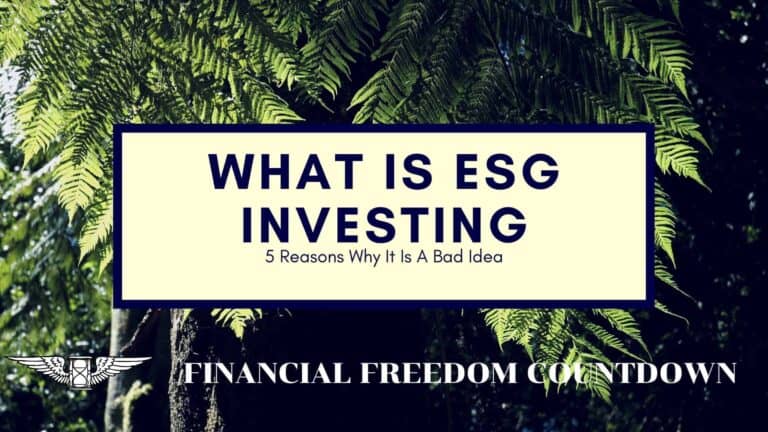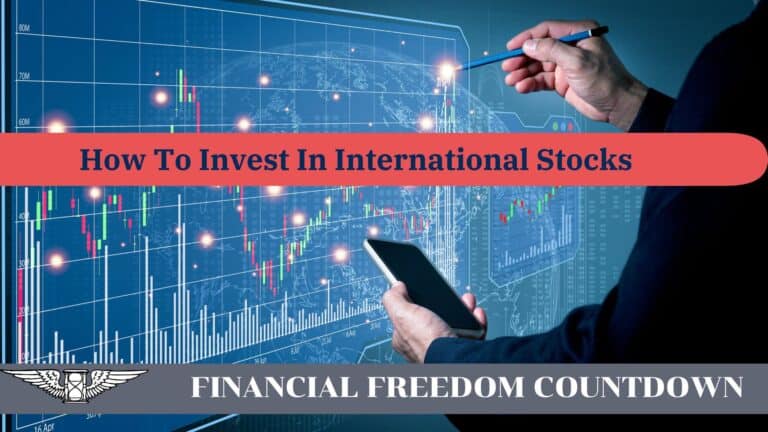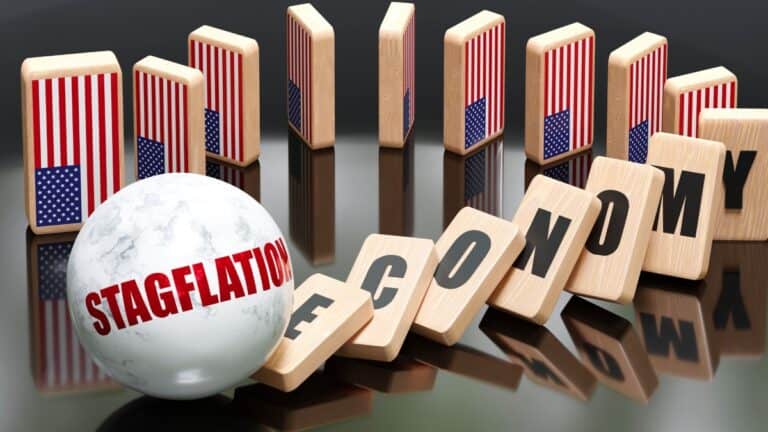Investing During a Recession: How To Protect Your Nest Egg
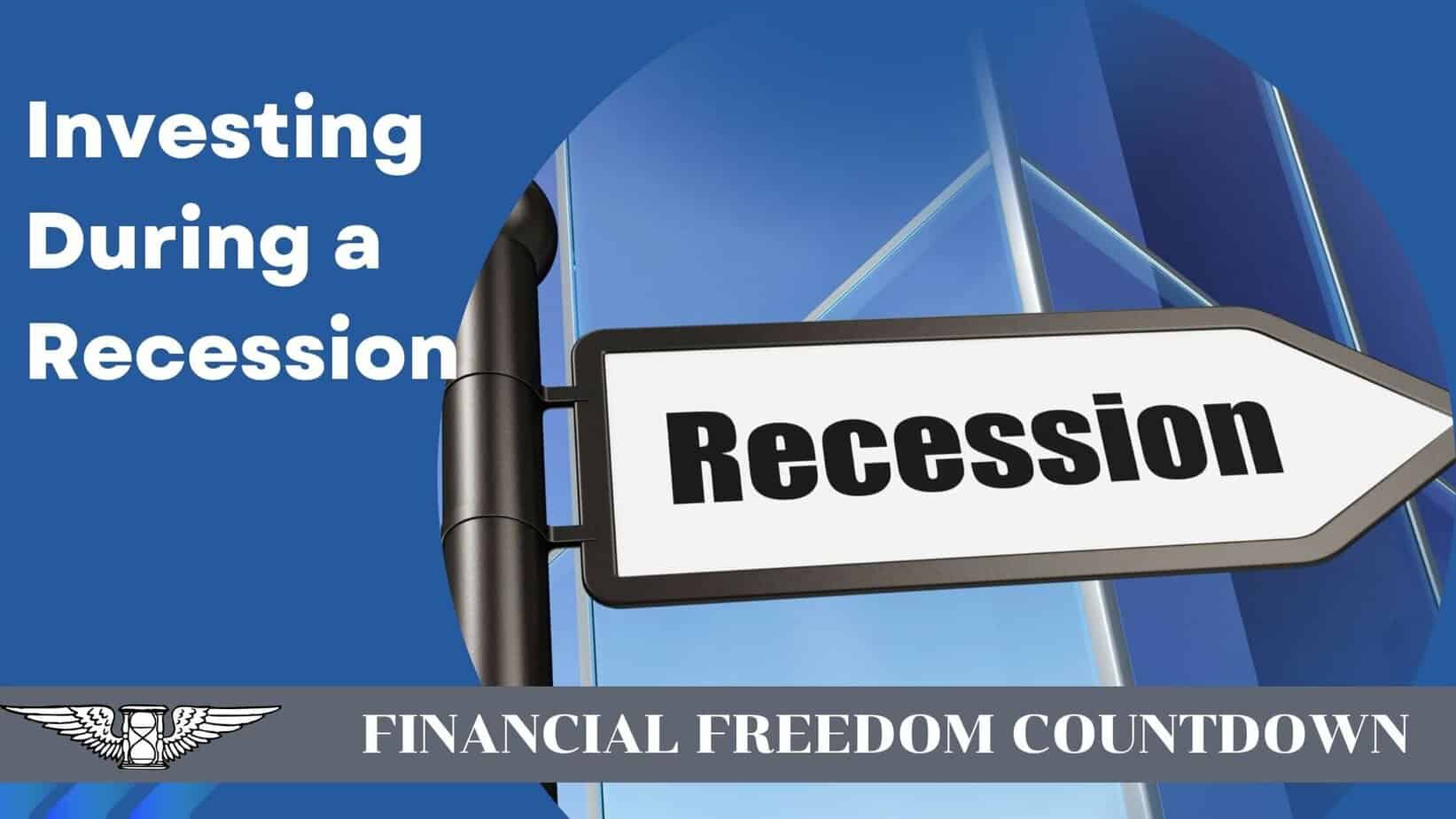
It’s no secret that the economy isn’t doing well right now. The rise in inflation coupled with the hawkish stance by the Federal Reserve might push us into a recession. Economists are watching an inverted yield curve, one of the most reliable predictors of a recession. The New York Fed model says the U.S. economy will contract this year and next, assigning an 80% probability to a hard landing.
Like most people, you’re probably wondering what you should do to protect your finances and make some money during this difficult time.
Today, we will discuss some tips for investing during a recession. We’ll also talk about how to stay safe while doing so. So whether you’re just starting or investing for years, read on for some valuable advice!
Investing in a Recession
During down economic cycles, many investors like to flee to safe-haven assets, like U.S. Treasury bonds, while most risk assets like stocks tend to drift lower and lower.
Investors might want to get out of the market and put their money into safer accounts. Warren Buffet’s famous quote is to be “fearful when others are greedy, and greedy when others are fearful.”
That means that when everyone else is jumping into the market for fear of missing out is the time to back off investing in the stock market. And when market sentiment shows that everyone is afraid of the market is the time to get back into the market. The time of fear in the market is a buying opportunity.
A bear market is defined as when stocks have dropped 20% or more from a recent high. Bear markets don’t have to occur in each market index simultaneously.
The Dow Jones Industrial Average can be in a bear market when the overall S&P 500 is not in a bear market. The Nasdaq can be in a bear market when the S&P 500 and the Dow are not. The Dow Jones is a more concentrated index with only 30 stocks, while the Nasdaq is more technology-focused. In contrast, S&P 500 is more broad-based, which is why investing in the S&P 500 provides broader diversification to all market sectors.
It is not wise to time the market bottoms. There is no way to know when bear markets have hit their bottom and when it is time to buy.
Dollar-cost averaging is the best strategy when investing in recessions or boom times.
Buying Stocks During a Recession
Defensive Sectors
Recessions can offer great stock prices after a crash. It is not always easy to pick and choose the best investments during a recession. Stocks are classified into different sectors so that investors can make better comparisons between stocks. The stock market is divided into the following 11 sectors.
- Consumer Staples
- Consumer Discretionary
- Energy
- Materials
- Industrials
- Utilities
- Health Care
- Financials
- Information Technology
- Communication Services
- Real Estate
During a recession, some sectors will do better than others. Those are the sectors that investors should pay attention to since the stocks in those sectors are known as defensive stocks. When investing during a recession, look for companies with strong balance sheets.
Investing in specific stock market sectors does better in an economic downturn because consumers still need their products and services, even when the economy is down. Like pharmaceutical companies, people still need their medications, whether there is a bull market or a bear market.
The sectors that consumers have difficulty cutting back on include
- Consumer Staples
- Healthcare
- Utility Companies
Dividend Stocks
During economic downturns, many investors will focus their investments on high-quality stocks that pay dividends. A dividend is a payment that a company sends to investors quarterly. Not all companies pay a dividend. Newer growth companies tend to reinvest any extra money into the company.
Most well-established companies pay a dividend. Dividend-paying stocks are recession fighters and can help lower portfolio risk because they provide an income stream. When a recession hits, you want to make sure to buy stocks that pay dividends in the right sectors, as mentioned above.
Dividends will offset losses in a portfolio and reduce portfolio volatility. Even if the stocks in a portfolio go down during a recession, an investor will still get paid the dividend. As investors start to sell their stocks with a worsening economic downturn, stocks will fall. The dividends will continue to provide a steady income.
Money from investments that pay dividends can be put back into the stock as an investor will average down, which is an excellent way to accumulate more stock when the stock is cheap. One can put the money from dividends into saving or investing.
However, be wary of high dividend yields since usually these are mature sectors and won’t offer much upside when the recession ends. Also, a high yield doesn’t necessarily mean it is an outstanding stock to buy. The yield may be elevated because the stock price has recently dropped. And if this drop occurred because of something wrong with the company, then there is a risk the company will cut its dividend soon.
Mutual Funds and Exchange-Traded Funds
Mutual funds and exchange-traded funds (ETFs) are similar in that they both are baskets of various investments like stocks and or bonds. Unless an investor is very good at picking individual stocks, it might be best to leave stock picking to the experts.
The fund managers that run mutual funds and ETFs pick and choose the best stocks for their funds. The great thing about these funds is that you can find one to fit any investment idea. For a recession, you can find funds that hold mostly health care stocks or only consumer staple stocks, etc.
Most, if not all, funds pay a dividend. Some funds to invest in during a down economic cycle include:
- Healthcare Select Sector SPDR (XLV)
- Utilities Select Sector SPDR (XLU)
- Vanguard Ultra-Short-Term Bond (VUBFX)
- The Consumer Staples Select Sector SPDR ETF (XLP)
- The Vanguard Dividend Appreciation ETF (VIG)
- The iShares U.S. Healthcare Providers (IHF)
- The Vanguard Consumer Staples ETF (VDC)
There are numerous sector funds like the consumer staples sector and the health care sectors that will do well in a recession.
Closed-End Funds
Closed-end funds are similar to mutual funds, but they are less liquid. The main difference is that closed-end funds usually trade at a premium or discount to their Net Asset Value (NAV) since no new shares are created.
With the increased market risk, investors can buy closed-end funds at a discount and wait for the price to match the NAV.
Closed-end funds invest in various assets, from municipal bonds to emerging markets.
Bond Investing During a Recession
Bonds usually do well in a recession, and moving money into bonds or bond funds is considered a safe move.
Bonds are known as fixed-income investments because they pay a fixed amount of interest. They don’t move much in price, and they all pay interest. The Federal Reserve might start to lower interest rates when a recession begins. That makes bonds more attractive to buyers. Bonds include municipal bonds, government bonds, and Treasury bonds. All investing involves risk, but bonds are a lower-risk investment than stocks.
During an economic downturn, bonds can do well, and plenty of funds hold fixed-income investments. Municipal bonds are bonds issued by cities and states to fund projects. These bonds are usually safe during slow economic times. Municipal bond funds are free from federal tax and could also be free from state tax if you live in the state where the bond was issued.
However, bond funds do not do well if the recession is inflationary with rising interest rates, as we have seen in 2022. The bonds in a bond fund are typically not held to maturity. The bond fund managers typically sell bonds to balance the fund’s duration, and since interest rates are rising, the value of the bonds purchased earlier tends to fall.
In a rising interest rate environment, holding individual bonds to maturity or building a ladder of individual bonds is advisable. Investing in I-Bonds is a low-risk strategy ensuring your cash keeps up with inflation.
Real Estate Investing During a Recession
The San Francisco Federal Reserve published a paper titled “The Rate of Return on Everything, 1870–2015,” which shows that residential real estate, not equity, has been the best long-run investment throughout modern history (1870 to 2015). As per the authors,” Returns on the two asset classes are in the same ballpark – around 7% –, but the standard deviation of housing returns is substantially smaller than that of equities (10% for housing versus 22% for equities). Predictably, with thinner tails, the compounded return (using the geometric average) is vastly better for housing than for equities—6.6% for housing versus 4.6% for equities.”
The most important part of the study was that although returns on housing and equities are similar, the volatility of housing returns is substantially lower.
Even though the Federal Reserve Bank is likely to raise interest rates, there are still many reasons to be excited about investing in real estate. Traditionally, real estate has been a great way to hedge against inflation. Typically, the value of real estate rises faster than inflation since your mortgage payment is fixed, but you can raise rents to market levels keeping pace or exceeding inflation.
Also, when the interest rates fall, you can refinance to lower mortgage rates.
When buying real estate, ensure you know how to evaluate a rental property.
Although it is possible to invest in real estate with little or no money, be cautious when in a recession.
Flipping houses could prove risky since buyers might not be available after you finish the rehab. For lack of a buyer, continuing to pay a high-interest rate on the hard money loan can ruin your personal finances.
Similarly, the BRRRR method could run into issues with the refinance step depending on the prevailing interest rates.
Farmland Investing During a Recession
Since it is doubtful that wheat will come out of Russia or Ukraine in 2022, now is an excellent time for farmland investing. In the past, investing in farmland was available to only the ultra-wealthy. However, with technological advances and crowdfunded investments, farmland is now accessible to almost everyone.
Farmland is well-suited to retain value over time, even during recessions. Farmland value increases when agricultural products become more expensive since the underlying land becomes more valuable.
Land in rural America has had a steady increase every year. As per the May 2022 Ag Credit Survey published by the Federal Reserve Bank of Kansas City, farmland values continued to increase rapidly through the end of 2021. Alongside sustained strength in farm income and credit conditions, the value of all types of farmland in the Tenth District was more than 20% higher than a year ago. The recent strength in agricultural real estate markets has been supported by solid demand, historically low-interest rates, and vastly improved conditions in the farm economy.
Farmland investing bears similarities with gold and other precious metals that investors lean on to hedge against market volatility. That’s because there’s a finite amount of farmland available, even though the global demand for food will require farms to double their output by 2050. It makes farmland uncorrelated with the rest of the market, making it a solid investment in volatile market years and adds diversification to your portfolio. Farmland investing can offer investors a consistent income while providing the safety of capital preservation. You have a tangible asset backing your investment.
Investing in Yourself
Although you might have worked out an iron-clad plan for how to retire early, it is advisable never to burn bridges. In a recession, your human capital is your most valuable income-producing asset.
Keep your certifications updated and your contacts warm even if you do not plan to return to work immediately.
And if you are still working, increase your high-income skills so you can be the last to be laid off or the first to find a better-paying job. Or use your skills to start a passive income business.
Of course, activities like starting a website involve a lot of effort upfront. However, having multiple income streams is always a great risk mitigation strategy, even if we are not in a recession.
As Warren Buffet said, “Your best investment is yourself. There is nothing that compares to it.”
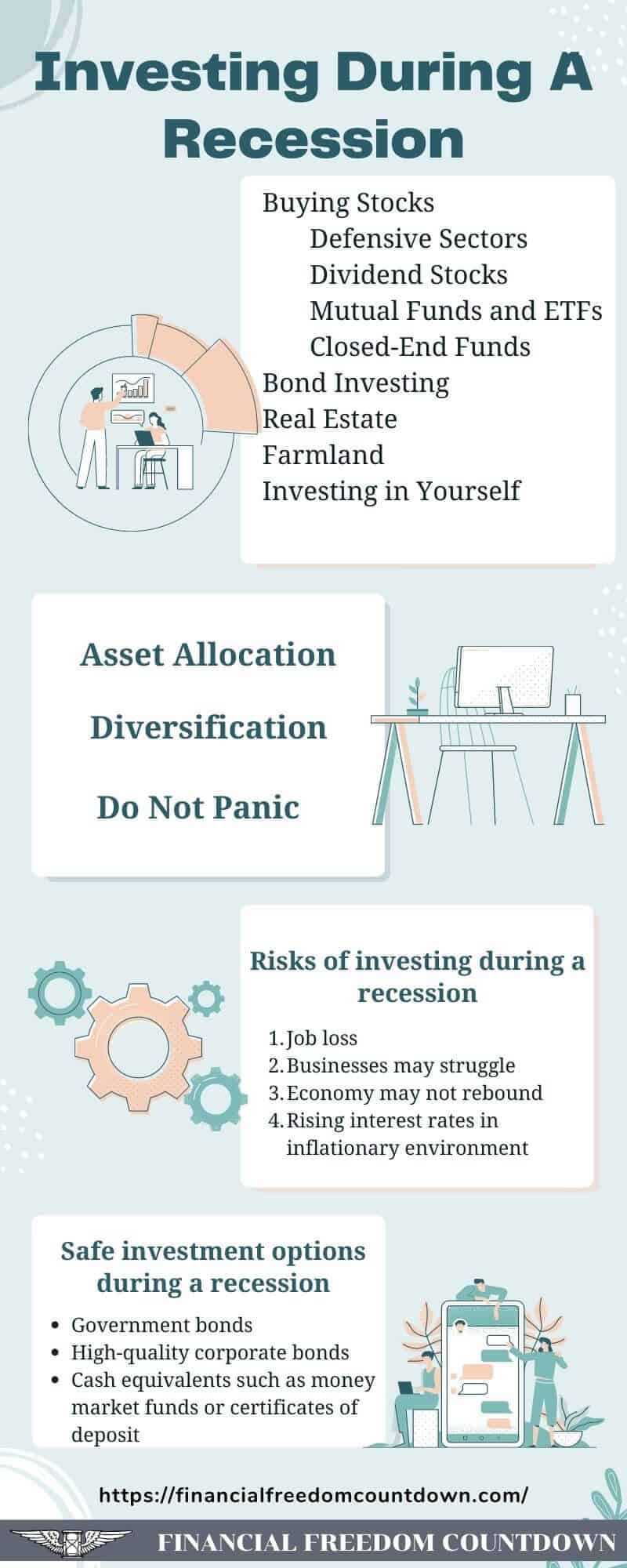
Asset Allocation and Diversification
Economic downturns can create volatility in the market. One day, it’s up, and the next day it’s down. To reduce portfolio volatility, investors diversify their portfolios.
A well-diversified portfolio holds diverse holdings like stocks in various sectors and different types of bonds. To further diversify a portfolio, investors might have a real estate investment trust stock (REIT), gold, precious metal stocks, and funds, or even riskier assets like art. Art investments are not very liquid, and metals can be volatile markets.
Even during the worst economic downturn, it is unusual for everything to fall in price simultaneously. What usually happens is when stocks go down, bonds could go up. If interest rates are rising and there is high inflation, stocks and bonds could drop, but precious metals could go up. By having a diversified portfolio, the gains will offset the losses to some degree.
Like the old saying, you don’t want all of your eggs in one basket in your investment accounts. If there is one specific investment you like, like a few growth stocks, invest in them, but make sure you have other assets.
Do Not Panic
It is important to not panic. Anyone new to investing during a recession, getting investment advice is crucial. Getting advice will help you make investment decisions and help to clarify your investment objectives. There are numerous ways a new investor can learn more and get advice like:
- Reading articles about investing during a recession. You can find articles on advisory or brokerage services websites.
- Get the help of a financial advisor from a wealth management company.
- Use online research tools, stock screeners, and a stock comparison service. Just remember that past performance doesn’t guarantee future performance.
- Take investing courses at a local college.
Final Thoughts on Investing During a Recession
You can do several things to stay safe while investing during a recession. By diversifying your portfolio, avoiding leverage, and having a long-term perspective, you can minimize your risk and increase your chances of making money.
Ideally, it would help if you did not make any drastic changes to your portfolio during a recession. Sticking to your existing asset allocation plan based on your risk tolerance for various assets is the best strategy.
If your current asset allocation deviates from your ideal asset allocation, you could consider rebalancing. Ideally, your asset location strategy should permit rebalancing in a tax-efficient manner.
A recession can be brutal for investors, as many risks are involved. However, there are also several opportunities to make money if you are willing to take a chance. Considering your options, you can find ways to make money even during a recession.
Additionally, several safe investment options can help you weather a recession. By being aware of the risks and opportunities involved in investing during a recession, you can make decisions that will help you stay safe and make money.
While recessions are often viewed as adverse events, they can also offer opportunities for businesses and individuals to make long-term investments at reduced prices. For example, during the Great Recession of 2008-2009, many companies and individuals took advantage of low-interest rates to invest in crypto, real estate, stocks, and other assets.
As a result, those who were able to weather the recession were well-positioned to benefit from the subsequent economic recovery. While there is no sure way to avoid a recession, understanding how they work can help you weather them more effectively if one does occur.
Investing during a recession can bring bargains to the equity market. When the economic cycle is down, that is the time to look for good stocks that have dropped too far in price. When investors buy stocks cheaper than they should be, when economic growth starts again, those stock prices will rise with the rest of the market.
Investing in dividend-paying stocks is an excellent way to limit losses, and if you reinvest the dividends, you will also gain market share in those investments. Look for stocks, ETFs, and closed-end funds with a long track record of paying dividends. High-quality dividend stocks have often performed better in recessions in the past. But past performance doesn’t guarantee future results.
Long-term investors should have a financial plan for investing during a recession. They might even expect to lose money during a market downturn, but they also know that they could make more money in the future if they don’t panic and sell everything.
Investing during a recession is as much about capital preservation as it is about finding suitable investments depending on one’s risk profile.
FAQs on Investing During a Recession
What are the risks of investing during a recession?
There are several risks associated with investing during a recession.
The most significant risk of investing in a recession is job loss. Ideally, your emergency fund should be ready to weather any long-term unemployment. However, if your financial goals are not aligned, you might invest the money and then be unable to have the cash to pay the bills when unemployed.
One of the key risks is that businesses may struggle to survive, resulting in their stock prices plummeting. It could lead to significant losses for investors.
Another risk is that the economy may not rebound as quickly as anticipated, which could mean it takes longer for investments to generate returns.
Additionally, interest rates tend to rise if inflation is an issue, which can eat into the returns on investment products such as bonds.
Finally, there is always the risk that the recession may deepen, which could have even more devastating consequences for investors.
Overall, while there can be some opportunities during a recession, it is essential to be aware of the risks before making any decisions.
How can you make money during a recession?
Many people assume that making money during a recession is difficult, but there are several ways to do so.
One option is to start your own business. It can be a riskier venture, but it also has the potential to be much more profitable than working for someone else.
Another option is to invest in stocks or real estate. These investments can be volatile, but they often increase in value after a recession.
Stock prices are typically lower during a recession, which means there is the potential to buy shares at a discount. However, it is also worth noting that companies may cut dividends or suspend them entirely during a recession, which can impact investors’ income.
Finally, you can also look for jobs in high demand during a recession. For example, jobs in healthcare or other essential industries are typically less affected by economic downturns.
Considering your options, you can find ways to make money even during a recession. While there are risks involved in investing during a recession, there can also be opportunities for those willing to take a chance.
What are some safe investment options during a recession?
A recession is caused by a decline in economic activity and can lead to lost jobs, decreased wages, and reduced spending. While this may seem like a reason to avoid investing altogether, several safe investment options can help you weather a recession.
One option is government bonds. These are issued by the government and backed by its full faith and credit, making them a very low-risk investment.
Another option is high-quality corporate bonds. These are issued by large companies with good credit ratings and tend to be less volatile than stocks, making them a good choice for investors who want to preserve their capital.
Finally, cash equivalents such as money market funds or certificates of deposit can also be a safe way to invest during a recession. These assets tend to be very stable and offer a relatively low return, but they can provide peace of mind during economic turmoil.
While there are no guarantees in investments, these options should offer you a safer place to put your money during a recession.

John Dealbreuin came from a third world country to the US with only $1,000 not knowing anyone; guided by an immigrant dream. In 12 years, he achieved his retirement number.
He started Financial Freedom Countdown to help everyone think differently about their financial challenges and live their best lives. John resides in the San Francisco Bay Area enjoying nature trails and weight training.
Here are his recommended tools
M1 Finance: John compared M1 Finance against Vanguard, Schwab, Fidelity, Wealthfront and Betterment to find the perfect investment platform. He uses it due to zero fees, very low minimums, automated investment with automatic rebalancing. The pre-built asset allocations and fractional shares helps one get started right away.
Personal Capital: This is a free tool John uses to track his net worth on a regular basis and as a retirement planner. It also alerts him wrt hidden fees and has a budget tracker included.
Streitwise is available for accredited and non-accredited investors. They have one of the lowest fees and high “skin in the game,” with over $5M of capital invested by founders in the deals. It is also open to foreign/non-USA investor. Minimum investment is $5,000.
Platforms like Yieldstreet provide investment options in art, legal, structured notes, venture capital, etc. They also have fixed-income portfolios spread across multiple asset classes with a single investment with low minimums of $10,000.
